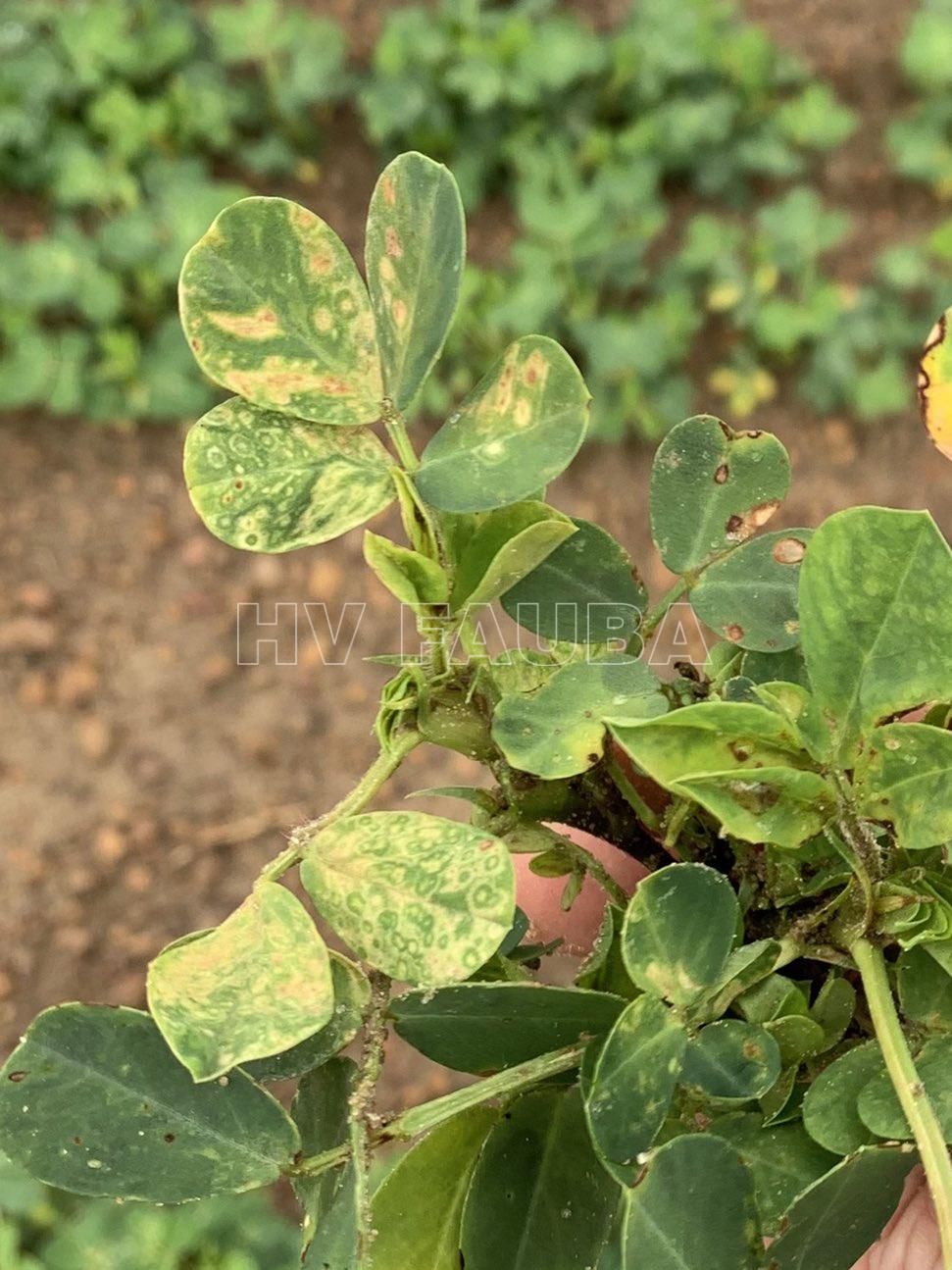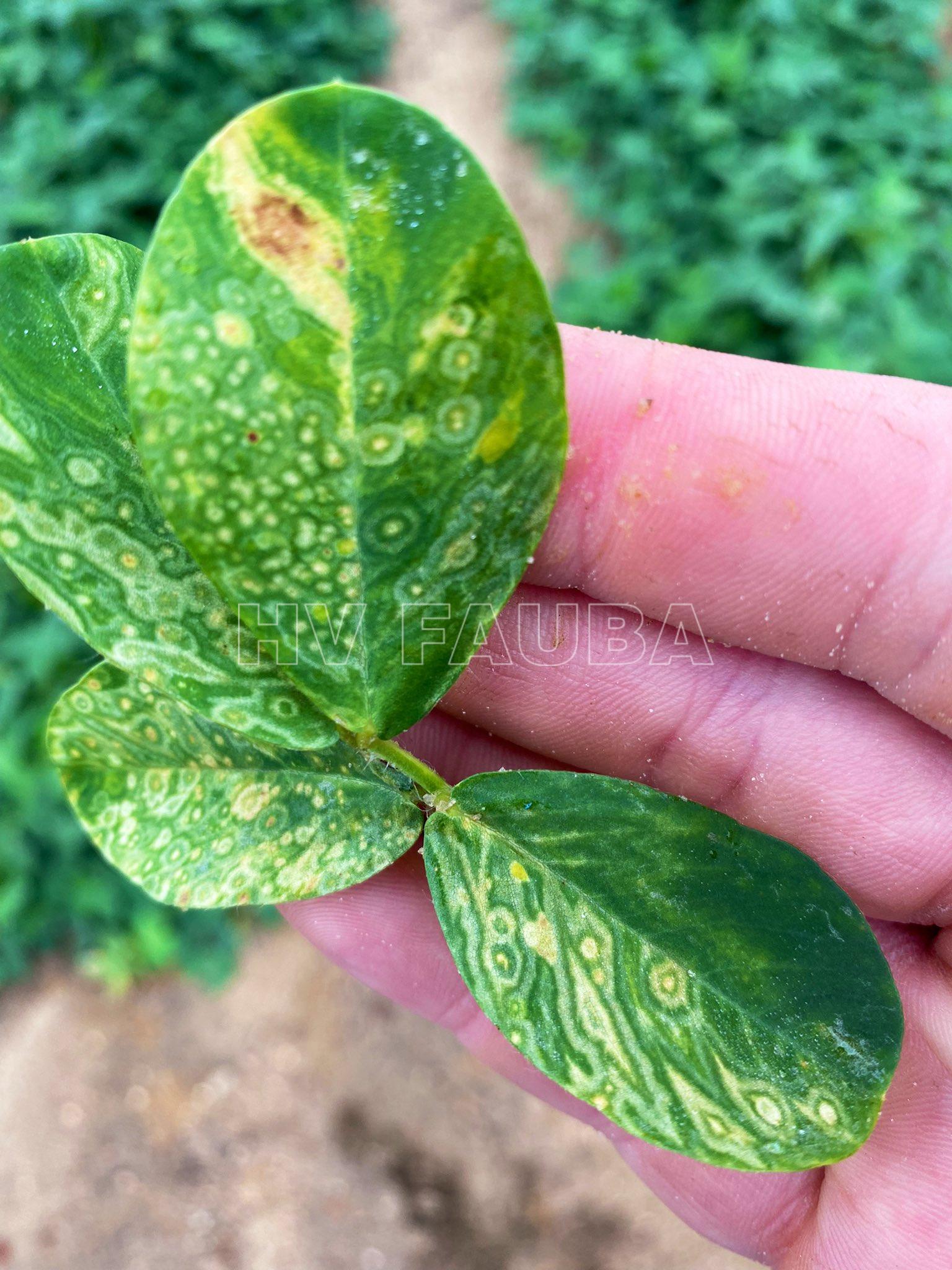.
Condición fitosanitaria: Presente
Grupo de cultivos: Hortícolas
Especie hospedante: Papa ( Solanum tuberosum)
Rango de hospedantes: amplio, puede infectar más de 550 especies de plantas de 70 famílias botánicas.
Etiología: Virus. (Biótrofo como todos los virus)
Agente causal: Tomato spotted wilt virus (Tospovirus, TSWV)
Taxonomía:
Viruses > Riboviria> Orthornavirae > Negarnaviricota > Polyploviricotina > Ellioviricetes > Bunyavirales > Tospoviridae > Orthotospovirus > Tomato spotted wilt orthotospovirus
.
ICTV: ssRNA negative-strand viruses > TSWV
ICTB Taxonomy history: Tomato spotted wilt orthotospovirus
Baltimore classification: Group IV: ssRNA(-) Baltimore, 1971
.
.
.
.
Síntomas
- Autor: Bob Kemerait
- Autor: Andrew Lovett
.
.
.
Bibliografía
Bandla MD, Westcot DM, Chenault K, et al. (1994) Use of monoclonal antibody to the nonstructural protein encoded by the small RNA of Tomato spotted wilt tospovirus to identify viruliferous thrips. Phytopathology 84: 1427–1431. doi: 10.1094/Phyto-84-1427
Bandla MD, Campbell LR, Ullman DE, Sherwood JL (1998) Interaction of Tomato spotted wilt tospovirus (TSWV) glycoproteins with a thrips midgut protein, a potential cellular receptor for TSWV. Phytopathology 88: 98–104. doi: 10.1094/PHYTO.1998.88.2.98
Chen J, Zhao Y, Luo X, et al. (2022) NLR surveillance of pathogen interference with hormone receptors induces immunity. Nature. doi: 10.1038/s41586-022-05529-9
de Assis Filho FM, Naidu RA, Deom CM, Sherwood JL (2002) Dynamics of Tomato spotted wilt virus replication in the alimentary canal of two thrips species. Phytopathology 92: 729–733. doi: 10.1094/PHYTO.2002.92.7.729
Kritzman A, Gera A, Raccah B, et al. (2002) The route of Tomato spotted wilt virus inside the thrips body in relation to transmission efficiency. Arch. Virol. 147: 2143–2156. doi: 10.1007/s00705-002-0871-x
Martin KM, Chen Y, Mayfield MA, et al. (2024) Visualizing tomato spotted wilt virus protein localization: Cross-kingdom comparisons of protein-protein interactions. Molecular Plant-Microbe Interactions 38(1):84-96. doi: 10.1094/MPMI-09-24-0108-R
Montero-Astúa M, Ullman DE, Whitfield AE (2016) Salivary gland morphology, tissue tropism and the progression of tospovirus infection in Frankliniella occidentalis. Virology 493: 39–51. doi: 10.1016/j.virol.2016.03.003
Moritz G, Kumm S, Mound L (2004) Tospovirus transmission depends on thrips ontogeny. Virus Res. 100: 143–149. doi: 10.1016/j.virusres.2003.12.022
Nagata T, Inoue-Nagata AK, Smid HM, et al. (1999) Tissue tropism related to vector competence of Frankliniella occidentalis for Tomato spotted wilt tospovirus. J. Gen. Virol. 80: 507–515. doi:
Nagata T, Inoue-Nagata AK, Prins M, et al. (2000). Impeded thrips transmission of defective Tomato spotted wilt virus isolates. Phytopathology 90: 454–459. doi: 10.1094/PHYTO.2000.90.5.454
Srinivasan R, Abney MR, Lai P-C, et al. (2018) Resistance to Thrips in Peanut and Implications for Management of Thrips and Thrips-Transmitted Orthotospoviruses in Peanut. Front. Plant Sci. 9: 1604. doi: 10.3389/fpls.2018.01604
, (2018) Relationships among symptoms of spotted wilt disease of peanut (Arachis hypogaea L.) and their potential impact on crop productivity and resistance breeding. Plant Breed. 137: 757– 762. https://doi.org/10.1111/pbr.12638
Ullman DE, Westcot DM, Hunter WB, Mau RFL (1989) Internal anatomy and morphology of Frankliniella occidentalis (Pergande) (Thysanoptera: Thripidae) with special reference to interactions between thrips and Tomato spotted wilt virus. Int. J. Insect Morphol. Embryol. 18: 289–310. doi: 10.1016/0020-7322(89)90011-1
Van De Wetering F, Goldbach R, Peters D (1996) Tomato spotted wilt tospovirus ingestion by first instar larvae of Frankliniella occidentalis is a prerequisite for transmission. Phytopathology 86: 900–905. doi: 10.1094/Phyto-86-900
Wagemans J, Holtappels D, Vainio E, et al. (2022) Going Viral: Virus-Based Biological Control Agents for Plant Protection. Annu Rev Phytopathol. 60: 21-42. doi: 10.1146/annurev-phyto-021621-114208
Whitfield AE, Ullman DE, German TL (2004) Expression and characterization of a soluble form of Tomato spotted wilt virus glycoprotein GN. J. Virol. 78: 13197–13206. doi: 10.1128/JVI.78.23.13197-13206.2004
Wijkamp I, Goldbach R, Peters D (1996) Propagation of Tomato spotted wilt virus in Frankliniella occidentalis does neither result in pathological effects nor in transovarial passage of the virus. Entomol. Exp. Appl. 81: 285–292. doi: 10.1046/j.1570-7458.1996.00098.x
(2023) TOM1 family conservation within the plant kingdom for tobacco mosaic virus accumulation. Molecular Plant Pathology 00: 1– 15. doi: 10.1111/mpp.13375

